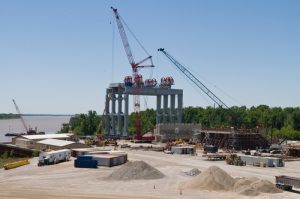
U.S. Rep. Don Bacon (R-NE) on May 19 unveiled a bipartisan bill that would require the U.S. Army Corps of Engineers to speed up the review of permit applications for certain flood control projects located near American military installations.
“We need to reevaluate, prioritize and expedite the levee application process so that when another natural disaster hits, our Armed Forces are prepared to respond,” Rep. Bacon said.
The congressman sponsored the Base Applications Sped Expeditiously (BASE) Protection Act, H.R. 6922, with cosponsor U.S. Rep. John Garamendi (D-CA), to direct the Corps of Engineers to prioritize and expedite Section 408 permit applications that provide military installations with enhanced resilience.
“Last spring, Nebraska faced one of the worst natural disasters in our state’s history,” explained Rep. Bacon. “Not only did the March floods damage homes, communities and businesses across Nebraska, Offutt Air Force Base was also greatly impacted” with nearly one-third of the base flooded causing the displacement of 3,200 workers and 3,000 feet of runway to be submerged.
“It took five years to approve a Section 408 application to raise Offutt’s levees an additional two to three feet,” he said. “That should not happen, and our military bases and surrounding communities should be protected.”
Section 408 is the process and criteria used by the Corps to review requests that would alter existing civil works projects, according to Rep. Bacon’s staff, which noted that such permit applications most often are for engineering and technical alterations.
If enacted, H.R. 6922 would provide consistent expedited evaluations and alterations to all existing civil works projects that protect military installations, according to a bill summary provided by Rep. Bacon’s office. The bill also would direct the Corps to develop and provide an annual report to Congress that shows the yearly progress made on the number of applications received and completed within the year, and the length of time it took to complete each application.
“I look forward to implementing this bipartisan bill in future infrastructure and environmental legislation,” Rep. Bacon said.



